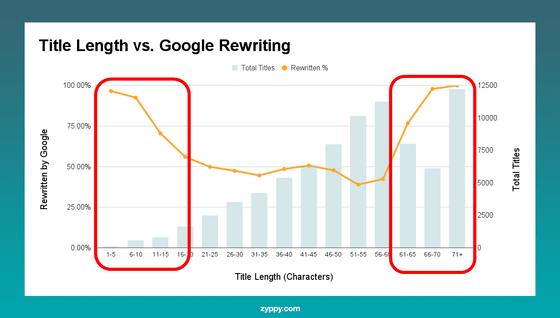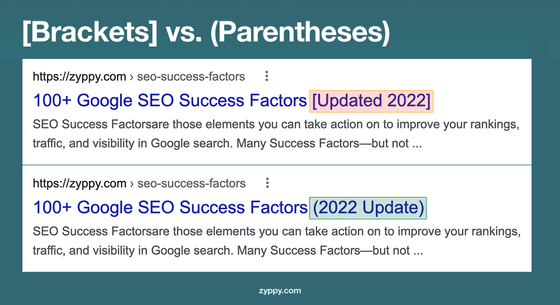Google rewrites the title of more than 60% of the page without permission and displays it in the search results, it is useless even if it is too long or too short

When trying to find information on Google Search, many people have seen the titles of pages in the search results that are unnaturally cut off, or abbreviated to make it difficult to understand the content. Should be. Since Google often rewrites page titles on its own, it often happens that titles displayed in search results are different from what the content creator intended. Cyrus Shepherd, CEO of Zyppy, who works on
We Studied 81,000 Page Titles - Google Rewrite 61% Of Them
https://zyppy.com/blog/google-search-title-rewrite-study/
Page titles are the first thing a Google searcher sees, so they have a big impact on your site's visitor count and click-through rate . Google has long rewritten page titles that appear in search results, but until now the changes have been minor. However, in recent years, as titles have been actively rewritten, it is becoming a problem for site owners.

In order to investigate the actual situation of page title rewriting by Google, Mr. Shepard uses
As a result, it turned out that Google rewrites the title of the page with a frequency of 61.6%. In particular, titles with the following tendencies were often rewritten.
- too long or too short
- The same keyword is used multiple times
・Delimited by separators such as '- (dash)' and '| (vertical bar)'
- Brackets are used
-Contains ' boilerplate ', a boilerplate phrase used in many other titles
・No brand name or extra brand name
After knowing the elements that are likely to be rewritten by Google, Mr. Shepard decided to delve into 'length', 'brackets' and 'separators', which have not been studied much.
◆Length
Google generally limits the width of titles to 650 pixels for desktop search results and slightly longer for mobile search results, and titles that exceed this width are ellipsis '... ” is omitted. On the other hand, titles that are too concise are also subject to rewriting.
Below is a graph showing the relationship between title length and rewrite rate, where the light green bar graph indicates the title length and the orange line graph indicates the rewrite rate. Looking at the pages with short and long titles enclosed in red frames, you can see that both are rewritten with a high probability.

Specifically, titles with 5 characters or less such as 'Home' or 'IBM' were rewritten with a probability of 96.6%, and the titles had additional words and information. In addition, over 76% of titles longer than 60 characters were rewritten, and 99.9% of titles longer than 70 characters were rewritten.
From this, Mr. Shepard pointed out, ``The right title length seems to be between 51 and 60 characters. Titles of this length had the lowest probability of being rewritten, at 39 to 42%.'' Did.
◆ Parentheses
Parentheses are often used to make keywords and terms stand out, but there was a big difference in the rewrite rate by Google between 'square brackets/[]' and 'round brackets/()'. Specifically, titles using square brackets were rewritten with a probability of 77.9%, and the contents of the brackets were completely omitted 32.9% of the time.

On the other hand, in the case of round brackets, the probability that the title was rewritten was 61.9%, and the probability that the contents of the brackets were omitted was 19.7%, which was a significantly better result than the square brackets.
``If you want to emphasize the text in the title, it's better to use round brackets, which are less likely to be deleted by Google,'' Shepherd said.

◆ Separator
Like parentheses, some separators were easily omitted by Google, while others were not. Specifically, when '-', which is most commonly used as a separator, is included, the incidence of rewriting or omitting the delimited part was 19.7%, whereas in the case of '|', the rate was 41%. .
From this result, Mr. Shepard said, ``Google tends to replace the vertical bar with another separator such as a dash.Using a vertical bar does not seem to be a disadvantage, but dashes are less susceptible to rewriting I'm sure,' he said.
◆ How can I prevent the title from being rewritten?
In the past, Google used only title tags to generate titles to display in search results, but in recent years, it has begun to consider HTML elements other than title tags. A typical example is the H1 tag .
For example, as mentioned above, the title using the vertical bar has a 41% chance of being rewritten, but if the vertical bar is used not only in the title tag but also in the H1 tag, the rewriting rate is almost halved to 20.6%. He said.
Also, if the title tag contains numbers, there is a 25.8% chance that the title will be rewritten without numbers, but if both the title and H1 tags contain numbers, the probability is 97.3%. , the title contains a number.
From this result, Mr. Shepard concluded, ``It seems that matching the contents of the title tag and the H1 tag is an effective strategy to dramatically reduce the probability of Google rewriting the title.''
Related Posts:
in Web Service, Posted by log1l_ks






